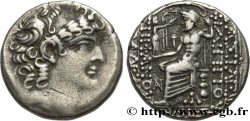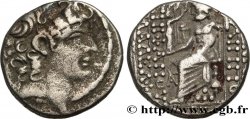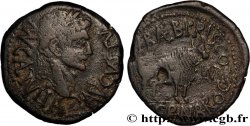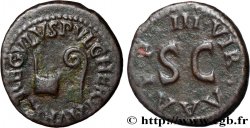bpv_295836 - AUGUSTUS Tétradrachme syro-phénicien
Not available.
Item sold on our e-shop (2013)
Price : 240.00 €
Item sold on our e-shop (2013)
Price : 240.00 €
Type : Tétradrachme syro-phénicien
Date: An 29 et 13e consulat
Mint name / Town : Antioche, Syrie, Séleucie et Piérie
Metal : silver
Diameter : 26 mm
Orientation dies : 12 h.
Weight : 14,22 g.
Catalogue references :
Predigree :
Cet exemplaire est le 0054_029 de la base TSP
Obverse
Obverse description : Tête laurée d’Auguste à droite entouré de la stemma (O*).
Obverse legend : KAISAROS SE-BASTOU (Kaisaros Sebastou).
Obverse translation : (César Auguste).
Reverse
Reverse description : Tyché (Ville d’Antioche) tourelée, voilée et drapée assise à droite sur un rocher, tenant une palme de la main droite ; à ses pieds à droite, l’Oronte nageant à droite.
Reverse legend : ETOUS - QK - NIKHS/ (UPAT) IG (Etous Nikhs).
Reverse translation : Nouvelle année victorieuse 29 / Treizième consulat / monogramme d’Antioche.
Commentary
Ce millésime se trouve à cheval sur la 29e année du règne et le passage du douzième au treizième consulat. Ce chevauchement fut certainement bref sur le douzième consulat puisque la version de l’an 29 avec le treizième consulat est dix fois plus commune.
Cette émission, qui s’étend de l’an 27 (5 AC) à la mort de l’Empereur, en l’an 44 du règne (14 AD) présente un type religieux plus oecuménique que ceux qu’utilisèrent les Séleucides : la Tyché de la ville d’Antioche. On peut penser que l’Antioche de l’époque, probablement une ville de 150 à 200.000 habitants, était un creuset de cultes différents et que les Romains, plutôt que d’imposer un dieu particulier, choisirent une image dans laquelle tous les Antiochéens, voire tous les habitants de la région, pouvaient se reconnaître. La statue de la Tyché représentée au revers, était la statue cultuelle de l’artiste Eutychides, si célèbre que des copies d’époque nous en sont parvenues.
À noter que le Cabinet des Médailles de Paris conserve un faux pour servir, plaqué, à ce millésime. Il n’a pas encore été possible de décider si les coins utilisés sont d’origine et officiels ou non.
Dans la base TSP maintenue par Michel Prieur, soixante-treize exemplaires sont maintenant répertoriés, dont huit en musées ou collections publiques (Paris, British Museum, Copenhague, Glasgow, ANS, Berlin, deux exemplaires, et Yale).
Cette émission, qui s’étend de l’an 27 (5 AC) à la mort de l’Empereur, en l’an 44 du règne (14 AD) présente un type religieux plus oecuménique que ceux qu’utilisèrent les Séleucides : la Tyché de la ville d’Antioche. On peut penser que l’Antioche de l’époque, probablement une ville de 150 à 200.000 habitants, était un creuset de cultes différents et que les Romains, plutôt que d’imposer un dieu particulier, choisirent une image dans laquelle tous les Antiochéens, voire tous les habitants de la région, pouvaient se reconnaître. La statue de la Tyché représentée au revers, était la statue cultuelle de l’artiste Eutychides, si célèbre que des copies d’époque nous en sont parvenues.
À noter que le Cabinet des Médailles de Paris conserve un faux pour servir, plaqué, à ce millésime. Il n’a pas encore été possible de décider si les coins utilisés sont d’origine et officiels ou non.
Dans la base TSP maintenue par Michel Prieur, soixante-treize exemplaires sont maintenant répertoriés, dont huit en musées ou collections publiques (Paris, British Museum, Copenhague, Glasgow, ANS, Berlin, deux exemplaires, et Yale).








 Report a mistake
Report a mistake Print the page
Print the page Share my selection
Share my selection Ask a question
Ask a question Consign / sell
Consign / sell
 Full data
Full data



